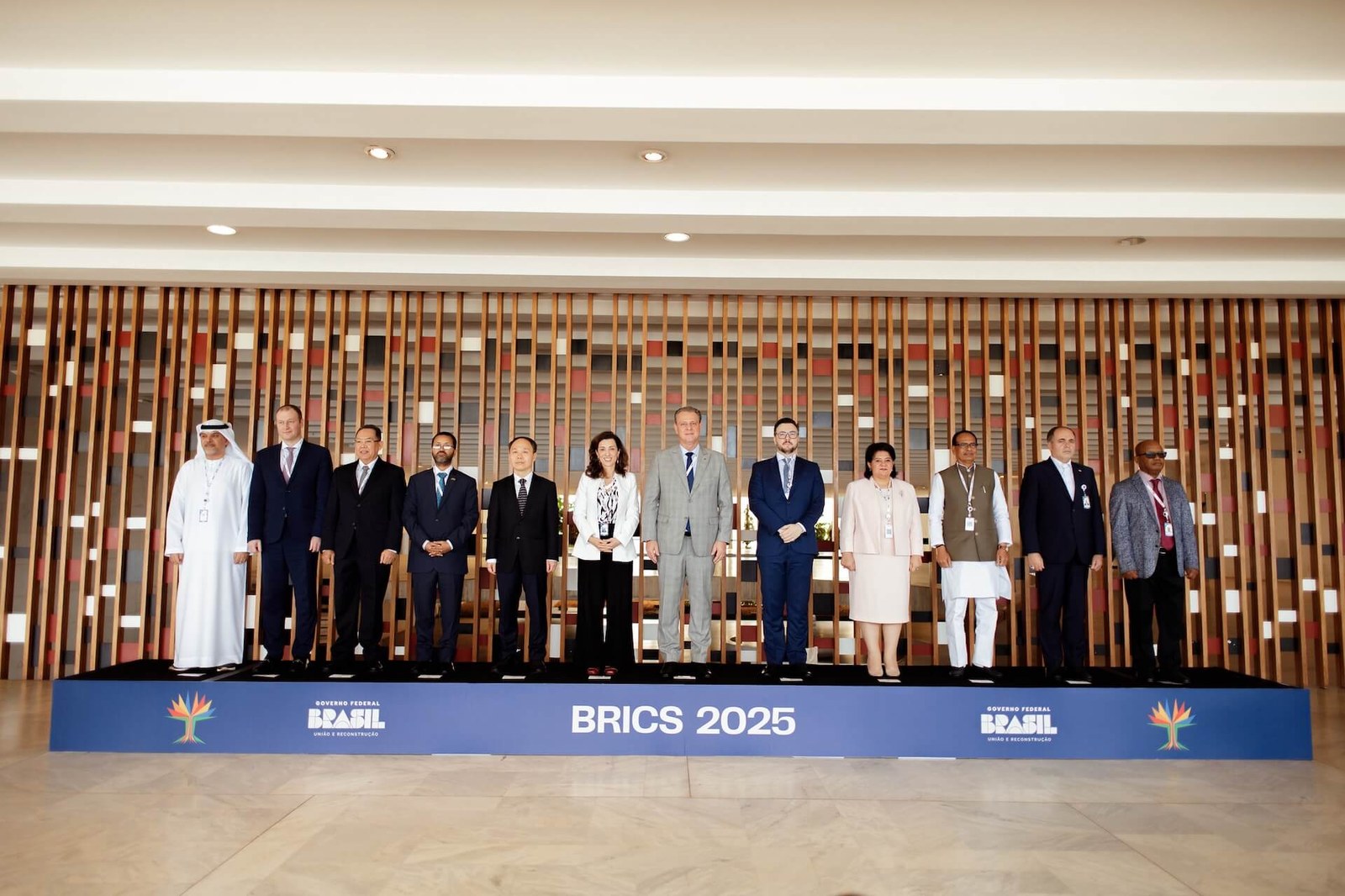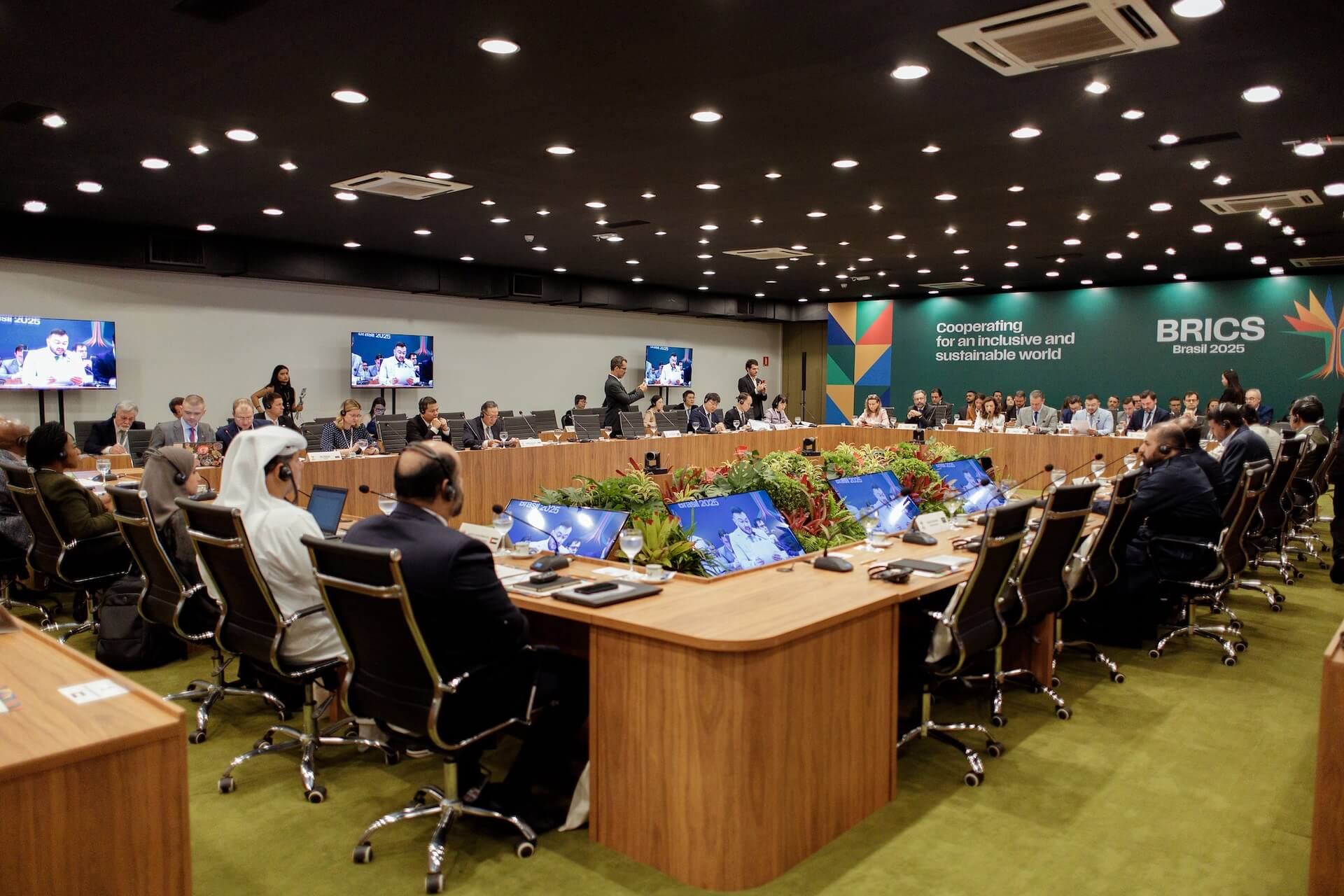BRICS countries approve Joint Declaration with focus on food security
Priorities include strengthening family farming, combating hunger, and facilitating agricultural trade among bloc members.

By Maiva D´Auria | maiva.dauria@brics.br
Promoting Inclusive and Sustainable Agriculture through Cooperation, Innovation, and Equitable Trade among BRICS was the theme of the Ministerial Meeting held on Thursday, April 4, in Brasília. The event brought together Agriculture Ministers and leaders from the 11 member countries, who approved and signed a Joint Declaration reaffirming their commitment to sustainable agricultural development, food security, and reducing inequalities in rural areas. Signing the declaration symbolizes the group's dedication to concrete, cooperative action. It is a political gesture that reinforces their unity and shared responsibility in pursuing common goals on the global stage.
BRICS countries represent 54.5% of the world’s population, hold one-third of global agricultural land, and possess over one-third of the world’s freshwater resources, according to Brazil’s Ministry of Agriculture and Livestock (Ministério da Agricultura e Pecuária/MAPA). Together, they account for 75% of global agricultural production and are home to roughly half of the world’s 550 million family farms—many of which are run by small-scale producers.
“This data not only reveals the productive and economic strength of the BRICS countries but also their decisive role in the world's agriculture and food security. Meetings like this are a privileged space for dialogue and cooperation, and for building joint solutions,” stated Brasil's Minister of Agriculture and Livestock, Carlos Fávaro.
"We all wish to reach the same level as Brasil regarding food production. Agriculture is a key aspect, and discussing this theme at BRICS is extremely valuable. Coming from a much marginalized and poor continent, such as Africa, where agriculture is not as developed, it is of great importance for us to participate in this process."
Focused on food security, sustainability, and facilitating international agricultural trade, the document approved by the ministers represents a landmark for global agriculture, establishing clear guidelines for the 2025-2028 period.
According to South African Ambassador Vusi Mavimbela, BRICS represents a strategic opportunity for exchanging experiences and strengthening cooperation among member countries, particularly in such key areas as agriculture.
"We all wish to reach the same level as Brasil regarding food production. Agriculture is a key aspect, and discussing this theme at BRICS is extremely valuable. Coming from a much marginalized and poor continent, such as Africa, where agriculture is not as developed, it is of great importance for us to participate in this process."
Food Security: Global Alliance against Hunger and Poverty

The first commitment relates to food and nutritional security, with emphasis on ensuring equitable access to quality food for all populations, particularly in times of global crises. The declaration recognizes the importance of the Global Alliance against Hunger and Poverty to promote international cooperation.
The country representatives recognized the essential role of agriculture as a cornerstone for eradicating hunger and reducing social and regional inequalities. Moreover, given that the New Development Bank (NDB) and the International Fund for Agricultural Development (IFAD) are founding members of the Global Alliance, the Declaration encourages both institutions to engage with member countries willing to implement policy instruments and programs related to this theme.
Among the agreed actions are the strengthening of strategic food reserves, investment in storage infrastructure, and the promotion of public policy instruments such as minimum price support and the monitoring of production costs — all aimed at stabilizing access to essential food items. These measures are intended to address price volatility, identified as one of the main challenges to global food security.
The Declaration also includes a commitment that, in exceptional situations affecting any BRICS country —such as food shortages or sudden price spikes— cooperation among members can support emergency responses, grounded in solidarity among the countries.
While respecting each country’s agricultural strategy, BRICS encourages the formation of food stocks, whenever possible, through the purchase of products from small-scale family farming. This approach can help revitalize and develop rural areas, generate income for low-income communities, and promote the value and preservation of local and native food production and consumption.
Family Farming
Regarding small-scale agricultural producers, the Executive Secretary of Brazil’s Ministry of Agrarian Development and Family Farming (Ministério do Desenvolvimento Agrário e Agricultura Familiar/MDA), Fernanda Machiaveli, emphasized the importance of strengthening policies for family farming and reaffirmed the bloc’s role in building a more sustainable and just future for small-scale producers.
She underscored that although the world is experiencing significant technological advancements, it is essential for innovation to reach small-scale agriculture. “Technology must serve to facilitate work in the fields, generate income, and ensure the production of healthy and diverse foods,” she argued.
Among the strategic items highlighted by the secretary and included in the Joint Declaration is the promotion of partnerships among Global South countries aimed at producing machinery and equipment tailored to family farming. The goals, she argued, are to promote dignity, attract young people to rural areas, and accelerate a just transition.
“Family farming is not responsible for the global rise in temperatures, as it does not contribute significantly to greenhouse gas emissions. Yet, it is the sector suffering the most from climate change, precisely because it depends on the climate. In this sense, these producers must be included in the transition process — first, so they can adapt; and second, because they will play a key role in mitigation through carbon sequestration, by adopting increasingly sustainable practices,” said Fernanda Machiaveli. She also emphasized that “family farming has the potential to combine agroecology, sustainable natural resource management, and the conservation of biodiversity by traditional populations.”
Egyptian Ambassador Mai Khalil recalled that the document also addressed the promotion of women’s participation in the agricultural sector, noting that women in rural areas are more vulnerable to food insecurity and malnutrition than men. Empowering women and reducing gender disparities in agriculture and food systems are essential for eradicating hunger, malnutrition, and poverty, as well as achieving Sustainable Development Goal (SDG) 5, which aims to achieve gender equality and empower all women and girls by 2030.
“BRICS countries are committed to addressing the needs of women and vulnerable groups. This concern was reflected in the development of the Joint Declaration, where we emphasized the importance of designing programs to support women in the rural sector, with a particular focus on credit, knowledge, technology, training, and finance,” the ambassador highlighted.
Sustainability and Innovation
Another important argument presented in the Joint Declaration is that BRICS countries have the potential to play a strategic role in the sustainable and inclusive increase of global agricultural productivity through the alignment of their industrial capacities with the needs of small-scale producers, both within the bloc and in other Global South nations. To advance on this path, the document recommends the adoption of investment strategies that foster partnerships among companies and universities in the member countries, promoting the local production of agricultural machinery and the voluntary exchange of innovative technologies adapted to regional contexts.
The Declaration proposes the establishment of a structured financing mechanism, potentially involving international organizations, to support projects focused on soil conservation and the restoration of degraded areas such as mangroves, riverbanks, floodplains, and wetlands. Priority actions include correcting soil acidity, controlling salinization, and investing in research, infrastructure, and technical assistance for agricultural workers and rural landowners. To support the adoption of these practices, the document highlights the launch of the BRICS Partnership for Land Restoration, in alignment with the framework of the United Nations Convention to Combat Desertification (UNCCD).
Fewer Barriers for Agricultural Trade
The third and final pillar of the Declaration focuses on facilitating international agricultural trade, intending to reduce unnecessary barriers, promote transparency, and enable the exchange of agricultural and livestock products among member countries. It also proposes the adoption of digital certification to reduce bureaucracy, mitigate the risk of fraud, prevent falsification, and improve traceability.
Another commitment is the potential establishment of a mechanism to facilitate financing for food imports within BRICS, as a means of providing emergency financial relief to low- and middle-income countries affected by rising costs of food and other essential inputs, such as fertilizers and energy.
“The result of the work carried out during this two-month cycle of intense dialogue is reflected in the Declaration we signed today. It represents a political commitment to our BRICS partners and to the world. Above all, it expresses our shared desire to move forward on what we consider a priority: ensuring that our populations have access to nutritious and safe food,” concluded Rivetla Edipo Araujo Cruz, Executive Secretary of the Brazilian Ministry of Fisheries and Aquaculture (Ministério da Pesca e Aquicultura/MAPA).
2025–2028 Action Plan
The event also marked the conclusion of the 2021–2024 Action Plan for Agricultural Cooperation among BRICS countries and the launch of the 2025–2028 Action Plan, which reflects a more ambitious approach aligned with principles that seek to balance food and agricultural needs with environmental sustainability.
This new plan will operationalize the political commitments outlined in the Declaration, setting goals, deadlines, and concrete initiatives to be submitted for approval at the BRICS Summit, scheduled for July 6–7 in Rio de Janeiro.